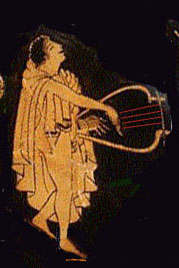
Ancient Greek musicians: A teacher shows a boy how to play pipes; a lyre hangs on the wall
Who played music in ancient Greece?
Both women and men played musical instruments. We often see Greek musicians painted on vases. Boys from rich families learned at school to play on the lyre, and to sing.
Schools in ancient Greece
What did Greek music sound like?
Women in ancient Greece
All our ancient Greece articles
Girls from rich families probably learned to play instruments at home, because they usually could not go to school. But most of the women playing instruments on vases are enslaved. They are working as entertainers at parties.
Slavery in ancient Greece

Ancient Greek musicians: a lyre lesson (the teacher has a beard)
Music competitions
Rich teenage boys, on the other hand, often competed for prizes in musical contests. Each town had its own competitions. There were also competitions like the Olympic Games (in honor of Zeus) or the Pythian Games (in honor of Apollo) where men came from all over Greece to compete. A panel of judges decided who won.
Ancient Olympic Games
Greek religion and festivals
Adult men, too, played and sang as part of public competitions. There were adult competitions during religious festivals. These competitions grew to include theater, like the comedies and tragedies of Sophocles, Euripides, and Aristophanes.
Greek theater: Sophocles
The plays of Euripides
Aristophanes and comedy

A rich woman plays a harp

A slave woman plays a lyre
Rhythm and melody
Some of the words we use to describe music today come from Greek words. The word “music” itself comes from the Greek Muses.
Who were the Muses?
Some Greek words that became English words are “rhythmos,” our word “rhythm”, and “melos” which now is our word “melody.”
Learn by doing: play the recorder
Listen to Greek music
Bibliography and further reading about Greek music:
Usborne Story of Music, by Eileen O’Brien (1998). Easy reading.
Music of the World, by Andrea Bergamini (1999). For teens.
Ancient Greek Music (Clarendon Paperbacks) by M. L. West (reprinted 1994). Not so easy to read, but it doesn’t assume that you know a lot of music theory.
Music in Ancient Greece and Rome, by John G. Landels (2001). Mainly about the practical side of music rather than music theory – who played it, and where, and for whom?
Apollo’s Lyre: Greek Music and Music Theory in Antiquity and the Middle Ages, by Thomas J. Mathiesen (2000) 0803230796 This one is more about Greek musical theory.
Music and the Muses: The Culture of Mousike in the Classical Athenian City, by Penelope Murray and Peter Wilson (2004).




